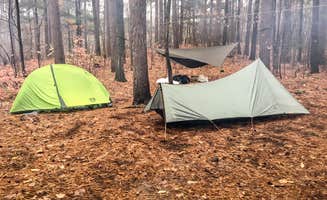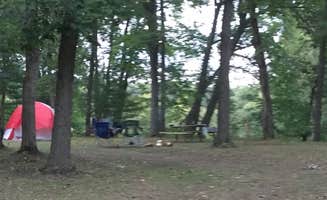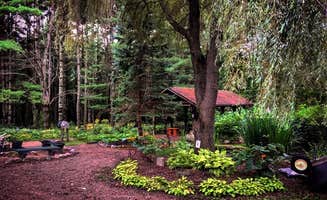Tent campsites near Weyerhaeuser, Wisconsin provide access to the glaciated landscape of northwestern Wisconsin at elevations between 1,100 and 1,500 feet. The region features kettle lakes formed by glacial activity and experiences average summer temperatures of 75-80°F, with nighttime lows reaching 45-55°F in spring and fall. The camping season typically runs late April through mid-October, with most primitive sites closing after the first significant snowfall.
What to do
Fishing local lakes: At Straight Lake State Park Campground, anglers can access both Straight Lake and Rainbow Trout Lake. "There are two parking lots. One by the stream connecting Straight Lake and Rainbow Trout lake. Path good condition," notes camper Loren S.
Backpacking multi-day routes: The Ice Age Trail segments connect multiple campsites for extended trips through Taylor County's sections of Chequamegon National Forest. A backpacker at Sailor Creek Campsite described crossing "the mile-long Hemlock Esker. An Esker is basically an inverted river... It also provides incredible views as you're about 80 feet up."
Explore geological features: The area's glacial history created unique terrain features accessible via hiking trails. The Jerry Lake Segment of the Ice Age Trail passes through "excellent diverse section of trail with many geologic wonders formed by continental glaciation, with the most recent effects formed at the end of the Wisconsin Glaciation, a period ending about 10,000 years ago."
What campers like
Solitude on no-wake lakes: The quiet atmosphere at North Twin Lake Recreation Area appeals to those seeking peaceful camping. "It's a no wake lake so plan on just using a trolling motor or even a canoe to fish," reports Aaron D. The restricted motor usage creates a quieter experience.
Accessible backcountry experience: Straight Lake State Park offers walk-in sites with equipment assistance. "The park offered carts to help pack in camping supplies," reports Tiffany K., making remote camping more accessible for those with heavier gear.
Water access options: Multiple sites feature direct lake or river frontage. At Phipps Landing, "You can drive in and park at this site, or canoe down the Namekagagen and pull up," notes Arctic D., describing the flexibility of arriving by vehicle or watercraft.
What you should know
Water availability varies: Many sites require water filtration or carrying in your supply. "Bring your own water or filtration. No rubbish bins," advises Arctic D. about Phipps Landing.
Facilities are minimal: Most sites feature primitive amenities with limited services. "Pit toilets. A little road noise from nearby highway," mentions Paul H. about the facilities at Phipps Landing.
Site conditions fluctuate seasonally: Spring brings muddy conditions while summer can produce dense undergrowth. At Picnic Point Campground, the seasonality affects access and site usability, with operations running "April 29 to October 30" according to forest service information.
Tips for camping with families
Seek lake-based sites: Lakes provide recreational opportunities for children. "Very nice lake, nice and private," notes Kelli D. about Picnic Point Campground, highlighting how water access enhances family camping experiences.
Consider walk-in difficulty: Some sites require hiking gear in from parking areas. Tiffany K. mentions that at Straight Lake State Park, "The amount of mosquitos seemed higher than other Wisconsin locations," which can be challenging for families with young children.
Reserve group sites when available: For larger family gatherings, specific areas accommodate multiple tents. Mark B. describes Picnic Point as an "Amazing group tent site on Mondeaux," noting it's a "Tent only, reservable group site at Mondeaux recreation area."
Tips from RVers
Water and electric availability: K and C Country Air Campground near Birchwood offers full hookup options. "Great place water sewer electric sites. Very quiet campground," notes Forest R., providing options for RVers needing utility connections.
Site spacing considerations: The layout at many campgrounds provides adequate separation between units. Aaron D. observed at North Twin Lake Recreation Area that "all the campsites on the lake had plenty of space for multiple tents or campers," indicating sufficient room for larger RVs as well.
Seasonal access limitations: Many forest service roads become inaccessible to larger rigs during spring thaw or after heavy rainfall. Early and late season camping may require additional planning due to weather variability and limited facility availability as most campgrounds close by mid-October.





